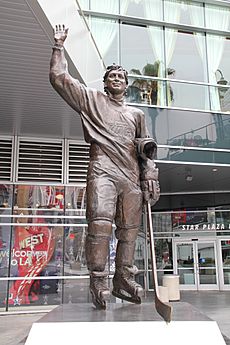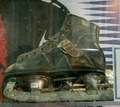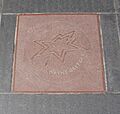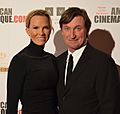Wayne Gretzky facts for kids
Quick facts for kids Wayne GretzkyCC |
|||
|---|---|---|---|
| Hockey Hall of Fame, 1999 | |||
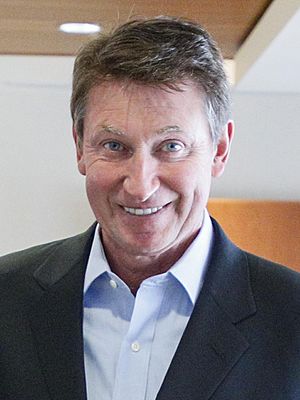
Gretzky in 2019
|
|||
| Born | January 26, 1961 Brantford, Ontario, Canada |
||
| Height | 6 ft 0 in (183 cm) | ||
| Weight | 185 lb (84 kg; 13 st 3 lb) | ||
| Position | Centre | ||
| Shot | Left | ||
| Played for | |||
| Coached for | Phoenix Coyotes | ||
| National team | |||
| Playing career | 1978–1999 | ||
| Coaching career | 2005–2009 | ||
Wayne Douglas Gretzky, often called "the Great One", is a famous Canadian former professional ice hockey player and coach. He played for 20 seasons in the National Hockey League (NHL) from 1979 to 1999. Many people, including hockey experts and former players, consider him the greatest ice hockey player of all time.
Gretzky holds many NHL records. He is the top scorer in NHL history for both total points and assists. He even has more assists than any other player has total career points! He is the only NHL player to score over 200 points in a single season, which he did four times. When he retired in 1999, he held 61 NHL records.
Growing Up: Wayne's Early Life
Wayne Gretzky was born on January 26, 1961, in Brantford, Ontario, Canada. His parents were Phyllis and Walter Gretzky. The family lived in a house with a flat yard, perfect for making an ice rink. Wayne had a sister, Kim, and three brothers, Keith, Glen, and Brent.
Walter Gretzky, Wayne's dad, taught him and his brothers how to play hockey on their backyard rink. They called it the "Wally Coliseum." Walter taught them special drills, like skating around bottles and flipping pucks over sticks. He always told Wayne to "skate where the puck's going, not where it's been." Wayne was a natural talent, much better than other kids his age.
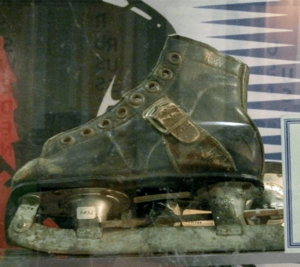
When Wayne was six, he played on a team with ten-year-olds. His coach, Dick Martin, noticed that Wayne handled the puck better than the older kids. Wayne was so good that other players' parents sometimes got jealous. He often wore a jersey that was too big, so he tucked it into his pants on the right side. He kept doing this throughout his NHL career!
By age ten, Gretzky had scored an amazing 378 goals and 139 assists in just one season. His incredible play caught the attention of media beyond Brantford. By age 13, he had scored over 1,000 goals in total.
Because of the pressure and negative attention, Wayne's family decided he should move to Toronto at age 14 to play hockey. He played Junior B hockey with the Toronto Nationals, even though the league included players up to 20 years old. He was named Rookie of the Year. At age 16, he joined the Sault Ste. Marie Greyhounds. It was there that he first wore the number 99 on his jersey. He wanted number 9, like his hero Gordie Howe, but it was taken. So, his coach suggested 99.
Starting Professional Hockey: WHA and NHL
In 1978, the World Hockey Association (WHA) was struggling. The WHA allowed players under 20, unlike the NHL. On June 12, 1978, 17-year-old Gretzky signed a seven-year contract with the Indianapolis Racers.
Gretzky played only eight games for Indianapolis. The team was losing a lot of money, so he was traded to the Edmonton Oilers. On November 2, Gretzky and two other players were flown to Edmonton. The Oilers' owner, Peter Pocklington, bought Gretzky for $700,000.
One exciting moment for Gretzky in the WHA was playing in the 1979 WHA All-Star Game. He played on a line with his childhood hero, Gordie Howe, and Howe's son, Mark. They scored many points together, and the WHA All-Stars won the series.
On his 18th birthday, January 26, 1979, Gretzky signed a ten-year contract with the Oilers. He finished third in scoring in the WHA and helped the Oilers finish first in the league. Soon after, the WHA merged with the NHL. The Oilers, along with three other WHA teams, joined the NHL. The Oilers were allowed to keep Gretzky on their team, even though he was still young.
Becoming a Star with the Edmonton Oilers (1979–1988)
Gretzky's success continued when the Oilers joined the NHL. In his first NHL season (1979–80), he won the Hart Memorial Trophy as the league's Most Valuable Player. He tied for the scoring lead with 137 points. This was the highest point total ever for a first-year NHL player.
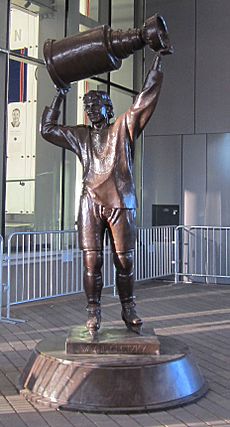
In his second season, Gretzky broke records for assists (102) and points (152) in a season, scoring 164 points. He won his second Hart Trophy. In the 1981–82 season, Gretzky broke a 35-year-old record by scoring 50 goals in just 39 games! He scored his 50th goal on December 30, 1981. Later that season, he broke the record for most goals in a season with 92. He finished the season with 92 goals, 120 assists, and 212 points, becoming the only player in NHL history to score over 200 points.
Gretzky continued to break his own records for assists and points in the following years. By the time he left Edmonton, he held or shared 49 NHL records.
The Edmonton Oilers became a very strong team with Gretzky. They had other future Hall of Famers like Mark Messier, Glenn Anderson, Jari Kurri, Paul Coffey, and Grant Fuhr. Gretzky was their captain from 1983 to 1988. In 1983, they reached the Stanley Cup Finals but lost. The next season, in 1984, they won their first Stanley Cup! The Oilers won the Stanley Cup three more times with Gretzky: in 1985, 1987, and 1988.
The "Gretzky Rule"
In 1985, the NHL changed a rule about penalties. Before, if both teams got a penalty at the same time, they would play with fewer players on the ice. The Oilers, with Gretzky, were very good at scoring goals when there was more open ice. The new rule meant that neither team lost a player when coincidental penalties were called. This rule change was nicknamed "the Gretzky rule" because it seemed to hurt teams like the Oilers who benefited from open ice. The rule was changed back in 1992.
Gretzky's Unique Style of Play
Gretzky changed how hockey was played. He focused on a team-based strategy. He wasn't the biggest or strongest player, but he was incredibly smart and could always tell where the puck was going. He was great at dodging opponents and making the right move at the right time. He often set up behind the opponent's net, an area nicknamed "Gretzky's office."
Hockey writer Ken Dryden said Gretzky was the first Canadian forward to play a true team game. He made his teammates better by making them skate and pass at his high level. Gretzky explained his style: "Let the puck do all the moving and you get yourself in the right place. I don't care if you're Carl Lewis, you can't out skate that little black thing. Just move the puck: give it up, get it back, give it up."
Gretzky was also an amazing passer and shooter. Hall of Famer Bobby Orr said, "He passes better than anybody I've ever seen." When opponents tried to stop his passes, Gretzky started shooting more himself. His shots were fast and accurate. He scored 92 goals in one season with only 369 shots, which is very efficient! Goalies often found his shots "sneaky fast" because they were surprised by their power.
Commentators often said Gretzky seemed to have "eyes in the back of his head" because he knew where everyone was on the ice. Gretzky said he sensed other players more than he saw them. He explained that his "instinct" came from years of studying and practicing the game.
The Famous Trade to Los Angeles (1988–1996)
After the Oilers won the Stanley Cup in 1988, Gretzky learned that the team planned to trade him. The Oilers' owner needed money. Gretzky agreed to be traded to the Los Angeles Kings, but only if his teammates Marty McSorley and Mike Krushelnyski joined him.
On August 9, 1988, Gretzky, McSorley, and Krushelnyski were traded to the Kings for other players, cash, and draft picks. This trade shocked many Canadians. Some even burned an effigy (a dummy) of the Oilers' owner outside the arena.
When Gretzky first played in Edmonton after the trade, he received a four-minute standing ovation from the fans. He told everyone, "I'm still proud to be a Canadian. I didn't desert my country. I moved because I was traded and that's where my job is. But I'm Canadian to the core." A life-sized bronze statue of Gretzky holding the Stanley Cup was put up outside the arena in Edmonton.
Gretzky immediately made a big impact on the Kings. He scored on his first shot in his first game. The Kings had their best start ever and made the playoffs. Gretzky finished second in scoring but won the Hart Trophy again. He led the Kings to upset his old team, the Edmonton Oilers, in the playoffs.
Gretzky's arrival made hockey much more popular in Los Angeles. The Kings started selling out games. Many people believe Gretzky helped put non-traditional hockey markets in the US on the "NHL map." California even got two more NHL teams during his time in Los Angeles.
In 1993, Gretzky led the Kings to the Stanley Cup Finals for the first time in their history. They lost to the Montreal Canadiens. The next season, Gretzky broke Gordie Howe's career goal-scoring record of 801 goals. However, the Kings team started to struggle. In 1996, Gretzky asked for a trade.
Short Stint with the St. Louis Blues (1996)
On February 27, 1996, Gretzky was traded to the St. Louis Blues. He was immediately named the team's captain. He played well, and the Blues almost made it to the Conference Finals. However, Gretzky's relationship with the Blues' coach, Mike Keenan, was not good. This meant Gretzky decided not to stay with the Blues when his contract ended.
Finishing His Career with the New York Rangers (1996–1999)
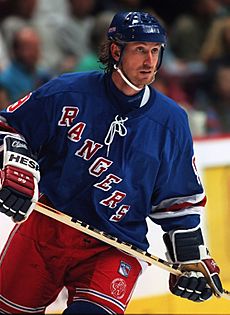
Gretzky signed with the New York Rangers as a free agent, joining his former Oilers teammate Mark Messier. He played his final three seasons there. In 1997, he helped the Rangers reach the Eastern Conference Finals, where they lost to the Philadelphia Flyers. This was Gretzky's last playoff run as a player.
In 1997, The Hockey News asked 50 hockey experts to rank the 50 greatest players in NHL history. They voted Gretzky number one. Gretzky himself said he would have voted for Bobby Orr or Gordie Howe.
The 1998–99 season was Gretzky's last as a professional player. He broke Gordie Howe's record for total professional goals (regular season and playoffs). His last goal brought his combined NHL/WHA career total to 1,072, one more than Howe.
Gretzky's last NHL game in Canada was on April 15, 1999, against the Ottawa Senators. After the game, he was given all three "stars" of the game, which is usually given to three different players. He then announced he would retire after the Rangers' last game.
His final game was on April 18, 1999, at Madison Square Garden in New York. Both the Canadian and American national anthems were played, with special lyrics added to honor Gretzky. He ended his career with one last point, an assist. At the time he retired, Gretzky was the second-to-last WHA player still active in professional hockey.
Playing for Canada: International Hockey
Gretzky first played for the Canadian national junior team at the 1978 World Junior Championships. He was only 16, the youngest player there, but he led the tournament in scoring. Canada won the bronze medal.
He then played for the Canadian national team in the Canada Cup and World Championships. He won his first international competition in the 1984 Canada Cup.
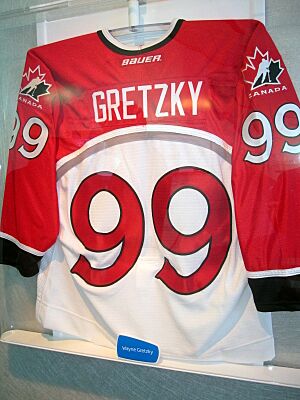
A highlight of his international career was the 1987 Canada Cup. Gretzky played with Mario Lemieux and called it the best hockey he ever played. They combined for a famous game-winning goal against the Soviet Union in the final game, which is still remembered as one of the most exciting plays in Canadian hockey history.
Gretzky also played in the 1998 Winter Olympics in Japan, the first time NHL players were allowed to compete. Canada lost in the semi-finals and did not win a medal. This was Gretzky's last international appearance. He holds records for most goals, assists, and points in "best-on-best" international hockey.
Life After Retirement
After retiring in 1999, Gretzky was immediately inducted into the Hockey Hall of Fame. The NHL also retired his jersey number 99 across the entire league, meaning no player in the NHL can ever wear number 99 again. This was a huge honor, like when baseball retired Jackie Robinson's number 42.
In Edmonton, a busy road was renamed Wayne Gretzky Drive in his honor. In 2002, the Los Angeles Kings put up a life-sized statue of Gretzky outside their arena. He also received a star on Canada's Walk of Fame in Toronto. His hometown of Brantford, Ontario, renamed a parkway after him and their sports center.
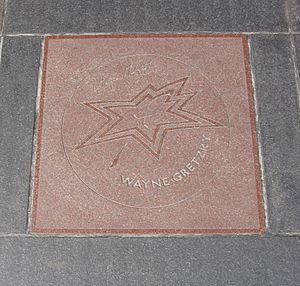
Coaching the Phoenix Coyotes
In 2000, Gretzky became a part-owner of the Phoenix Coyotes NHL team. In 2005, he also became their head coach. He coached the team for four seasons. The Coyotes did not make the playoffs during his time as coach. In 2009, Gretzky stepped down from his coaching and ownership roles.
Olympic Roles
Gretzky was the executive director for the Canadian men's hockey team at the 2002 Winter Olympics in Salt Lake City. After a slow start, he famously spoke out to defend his players from media criticism. The Canadian team went on to win the gold medal, their first in 50 years!
He was also an ambassador for Vancouver's successful bid to host the 2010 Winter Olympics. During the opening ceremony of those Games, Gretzky was one of four famous Canadian athletes who jointly lit the Olympic cauldron. He then lit a second, outdoor cauldron, making him the final torchbearer.
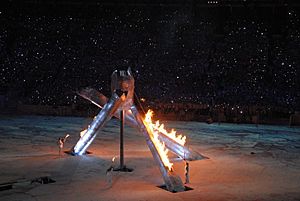
Other Ventures
Gretzky has been involved in many business ventures. He owned a junior hockey team and was a part-owner of the Toronto Argonauts football team. He has also endorsed many products and has his own winery and restaurants.
He has written several books about his life and hockey, including Gretzky: An Autobiography and 99: Stories of the Game.
Wayne Gretzky's Legacy
Gretzky's career achievements are incredible. He won the Hart Trophy (MVP) nine times and the Art Ross Trophy (scoring leader) ten times. He also won the Conn Smythe Trophy as playoff MVP twice and the Ted Lindsay Award five times. He received the Lady Byng Memorial Trophy five times for his sportsmanship.
In 1984, Gretzky was appointed an Officer of the Order of Canada, one of Canada's highest honors. He was promoted to a Companion of the Order of Canada in 2009, the highest rank. This honor recognized his amazing hockey career and his charity work, including helping young people play hockey.
Several awards and places are named after him, like the Wayne Gretzky International Award and the Wayne Gretzky 99 Award in junior hockey. His impact on hockey, especially in making it popular in new areas, is a huge part of his legacy.
Images for kids
See also
 In Spanish: Wayne Gretzky para niños
In Spanish: Wayne Gretzky para niños
 | Charles R. Drew |
 | Benjamin Banneker |
 | Jane C. Wright |
 | Roger Arliner Young |


